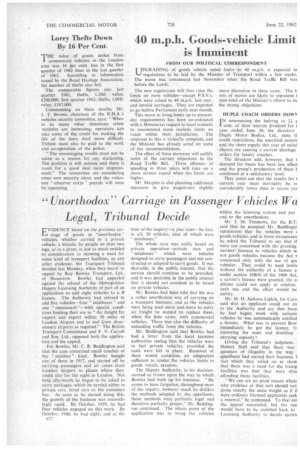"Unorthodox" Carriage in Passenger Vehicles Wa Legal, Tribunal Decide
Page 28

If you've noticed an error in this article please click here to report it so we can fix it.
EVIDENCE based on the previous carriage of goods in unorthodox" vehicles, whether carried in a private vehicle, a bicycle, by people on their two legs, or in a pram, is just as much entitled to consideration as showing a need for some kind of transport facilities, as any other evidence, the Transport Tribunal decided last Monday, when they heard an appeal by Roy Bowles Transport, Ltd., of Hounslow. Bowles had appealed against the refusal of the .Metropolitan Deputy Licensing Authority of part of an application to add eight vehicles to a B licence. The Authority had refused to add five vehicles—four " minibuses" and one " omnicoach "—with special conditions limiting their use to " Air freight for import and export within 30 miles of London Airport and to and from diversionary airports as required." The British Transport Commission and F. V. Carroll and Son, Ltd., opposed both the application and the appeal.
For Bowles, Mr. C. R. Beddington said that the case concerned small coaches of the " minibus " kind. Bowles bought one of these in 1957, and started off by carrying passengers and air crews from London Airport to places where they could stay for the night in London. Not long afterwards he began, to he asked to carry packages, which he carried either in private cars, hired cars or the miniature bus. As soon as he started doing this, the growth of the business was :astonishingly rapid. By October, 1959, he had four vehicles engaged on this work, By October. 1960, he had eight; and at the
ri.72 time of the inquiry—a year later—he had, in all, 20 vehicles, nine of which were " minibuses."
The whole ease was really based on private operation—private cars and "minibuses" which were vehicles designed to carry passengers and not constructed or adapted to carry goods. It was desirable, in the public interest, that the service should continue to he provided, and it was desirable in the public interest that it should not continue to be based on private vehicles.
Mr. Bowles had been told that his was a rather unorthodox way of carrying on a transport business, and as the vehicles were being used more and more to carry air freight he wanted to replace them,. when the time came, with commercial vehicles, There was also the difficulty of unloading traffic from the vehicles.
Mr. Becldington said that Bowles had had a letter from the local taxation authorities stating that the vehicles were in fact private 'vehicles, provided the seats were left in place. Removal of them would constitute an adaptation sufficient to render the vehicles liable to goods vehicle taxation.
The Deputy Authority, in his decision, seemed to frown upon the way in which Bowles had built up his business. "He seems to have forgotten, throughout most of the inquiry, however much he dislikes the methods adopted by the appellants, those methods were perfectly legal and therefore perfectly proper," Mr. Beddington continued. The whole point of the application was to bring the vehicles within the licensing system and put end to the unorthodoxy.
Mr. J. M. Timmons, for the B.T. said that he accepted Mr. Beddingto submission that• the vehicles were goods vehicles, and in those eircumslart he asked the Tribunal to say that ti were not concerned with the granting carriers' licences to vehicles which w not goods vehicles because the Act v concerned only with the use of got vehicles. They could be used lawfu without the authority of a licence a under section 168(4) of the 1960 Act, a carrier's licence were granted, the cl ditions could not apply in relation such use and the effect would be nullity.
Mr. M. H. jackson Lipkin, for Carr, said that an applicant could not co to the Authority and say that becal he had begun work with tinker vehicles he was automatically entitled a licence. What was to prevent Bow, immediately he got the licence, fr, removing the seats and doubling carryingcapacity?
Giving the Tribunal's judgment, Hubert Hull said that there was question of illegality in the way appellants had started their business. 1 fact which they relied on as show that there was a need for the transp facilities was that they were alrez affording those facilities.
We can see no good reason whale why evidence of that sort should not given exactly the same weight as if tl were ordinary licensed applicants seek a renewal," he continued. To that ext the appeal succeeded, but the mai would have to be remitted back to Licensing Authority to decide quantt












































































































